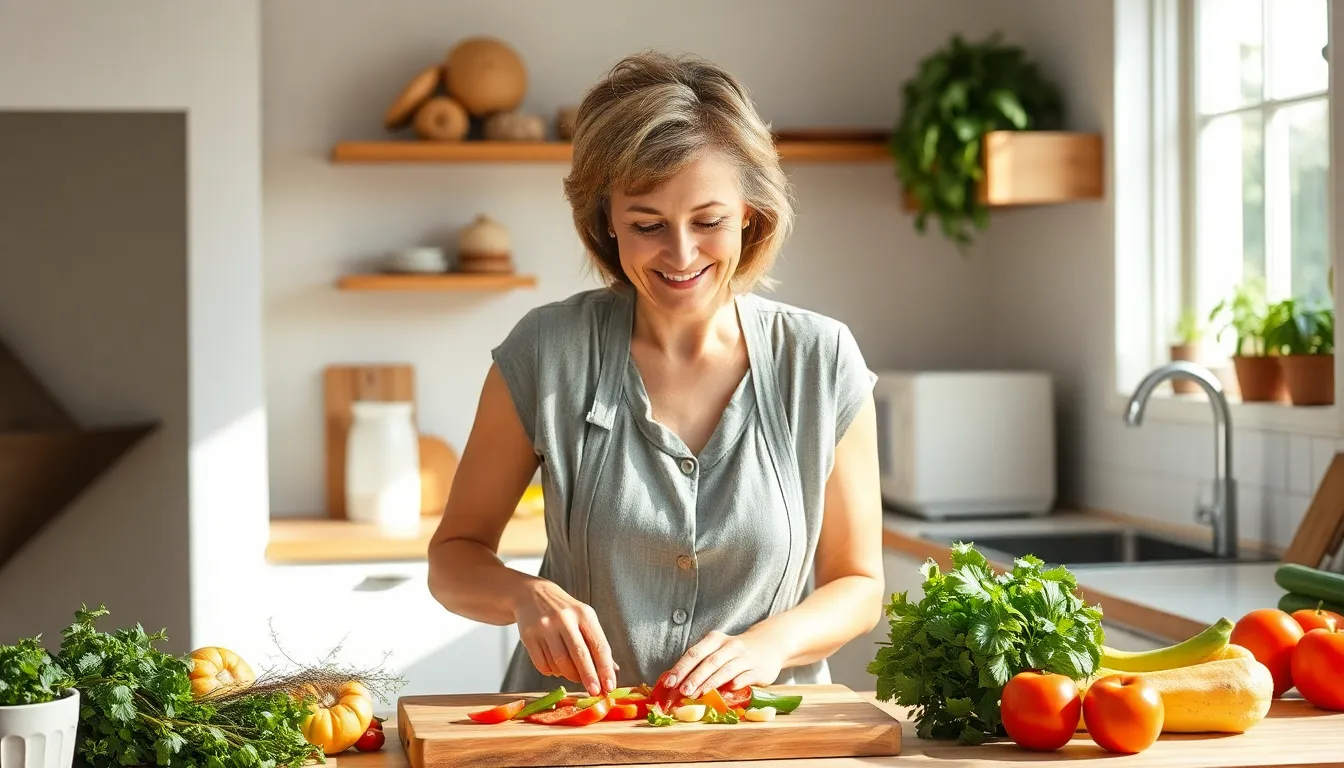In a world where multitasking reigns supreme, mindful cooking offers a delicious escape from the chaos. Imagine transforming your kitchen into a sanctuary where each chop, simmer, and sauté becomes a meditative experience. It’s not just about whipping up a meal; it’s about savoring the process and reconnecting with the art of cooking.
Forget the frantic dinner rush and embrace a more intentional approach. Mindful cooking habits not only elevate your culinary skills but also boost your mood and well-being. So grab that apron and get ready to turn your kitchen adventures into a delightful journey. Who knew that mindfulness could be so tasty?
Table of Contents
ToggleUnderstanding Mindful Cooking Habits
Mindful cooking centers on the act of preparation, allowing individuals to connect with their food and create a serene experience. This approach invites a presence in the kitchen, enhancing each step of the cooking process.
The Philosophy of Mindfulness
Mindfulness emphasizes awareness and presence in daily tasks. Cooking offers a perfect opportunity to immerse in the moment, inviting attention to flavors, aromas, and textures. It cultivates an appreciation for each ingredient and transforms preparation into a ritual. By focusing on the sensations experienced while cooking, individuals engage more fully with their meals. Practicing mindfulness in the kitchen builds a deeper connection to food, encouraging thoughtful choices in ingredients and techniques.
Benefits of Mindful Cooking
Mindful cooking provides numerous advantages for both mental and physical well-being. It reduces stress, promoting relaxation through the intentional act of preparing meals. Enhancing culinary skills occurs naturally as individuals pay close attention to their techniques. Improved focus leads to better decisions about nutrition, resulting in healthier eating habits. Incorporating mindfulness fosters a greater sense of satisfaction with meals, making them more enjoyable. Additionally, this practice encourages creativity and experimentation, allowing for personal expression in the kitchen.
Essential Practices for Mindful Cooking


Mindful cooking encourages a deeper connection with the culinary process. Essential practices enhance the experience, making every moment in the kitchen intentional.
Preparing the Cooking Environment
Creating a conducive cooking space significantly impacts the experience. Start by decluttering the kitchen for easier movement. Include natural elements like plants to promote a calming atmosphere. Organizing tools and utensils increases efficiency during meal prep. Setting the mood with pleasant lighting contributes to focus and enjoyment. Maintaining cleanliness ensures a hygienic environment, fostering peace of mind. Each of these steps transforms the kitchen into a sanctuary for mindful cooking.
Choosing Ingredients Consciously
Selecting ingredients enhances the mindful cooking experience. Focus on seasonal and local produce for freshness and better flavor. Opting for organic ingredients supports sustainability and health. Reading labels carefully helps understand potential allergens or additives. Exploring diverse ingredients opens up new culinary possibilities, enriching creativity. Engaging with local farmers or markets promotes community connections, making food purchasing more personal. Every choice reflects an appreciation for quality and intention in preparing nourishing meals.
Techniques to Enhance Mindfulness in Cooking
Mindful cooking involves using specific techniques to amplify the experience in the kitchen. Engaging the senses and focusing on the process cultivates a more present and enjoyable cooking environment.
Engaging the Senses
Engaging all five senses transforms cooking into a sensory experience. Observe the vivid colors of fresh ingredients as they inspire creativity. Listen to the sounds of chopping and sizzling, which can enhance awareness. When smelling spices and herbs, he or she taps into the aroma’s ability to evoke memories. Taste testing throughout the process allows for adjustments, making dishes more personal. Additionally, feeling the textures of vegetables and grains deepens the connection to each ingredient, fostering a greater appreciation.
Focusing on the Process
Focusing on each step of the cooking process encourages mindfulness. Begin with thoughtful preparation, gathering all required tools and ingredients. Following a recipe is less about strict rules and more about exploration. Take time to appreciate each motion while chopping, mixing, or sautéing. He or she can also pause to reflect on the significance of each ingredient. Setting timers or practicing slow movements promotes awareness of time and progress. Enjoying the rhythm of cooking ultimately leads to a deeper connection with food and enhances overall satisfaction.
Integrating Mindful Cooking Habits into Daily Life
Mindful cooking can seamlessly integrate into daily routines, making it a part of everyday life.
Setting Realistic Goals
Creating achievable cooking goals helps maintain enthusiasm. Start with simple recipes, gradually increasing complexity as confidence grows. Plan weekly meals focusing on seasonal ingredients. Aim for one new dish each week to encourage exploration without overwhelming oneself. Establish time limits for meal prep to enhance focus while making the task manageable. Document progress in a cooking journal. This practice reinforces commitment and creates a sense of accomplishment, encouraging continued engagement with mindful cooking.
Reflecting on the Cooking Experience
Taking time to reflect after cooking enhances the overall experience. Evaluate what went well during the cooking process and identify areas for improvement. Assess the enjoyment level and the satisfaction derived from the meal. Keeping a cooking journal helps capture thoughts and feelings about each culinary experience. Share experiences with friends or family to foster community and gain new perspectives. Engaging in this reflection nurtures growth and solidifies the connection to mindful cooking.
Embracing mindful cooking habits can transform the kitchen into a sanctuary of creativity and calm. By focusing on the process rather than just the outcome individuals can cultivate a deeper connection with their food. This approach encourages not only improved culinary skills but also enhances overall well-being.
As one engages with each ingredient and step in the cooking process the benefits extend beyond the plate. Mindful cooking fosters a sense of community and personal expression while promoting healthier eating habits. By integrating these practices into daily life anyone can find joy and satisfaction in the kitchen.



